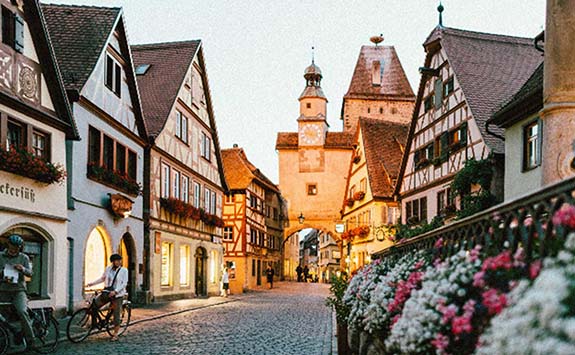German
Study German as part of your Combined Honours degree. Explore German culture and a combination of practical language study and communication skills.
All Combined Honours students studying a language, have the option to go abroad for an Intercalating Year between Stages 2 and 3. You'll be based in Germany or Austria, to develop your language knowledge and expertise.
When you return in Stage 3, you'll continue to study German language and optional non-language modules. You can also choose to write a dissertation on an approved topic relating to Germany.
German is offered by the School of Modern Languages.
You can meet people from different cultures and all over the world by joining our Modern Languages Society
Pre-requisites
German can be studied from Level A (both true beginners and post-GCSE), or from Level B (post A-level or equivalent).
A maximum of two language subjects can be taken together, but only one of these can be at beginner's level.
It's not possible to study two language subjects on their own without a third non-language subject.
Stage 1
Select the module code for specific module information including the module summary and aims, knowledge and skills you'll gain, and the module leader.
If you are a beginner, you will select Level A. If you have an A-Level in German, you will select Level B.
Students study 40 or 60 credits from the list below at Stage 1.
Level A
Compulsory modules
| Module Code | Module Title | Credit Value | Semester |
|---|---|---|---|
| GER1065 | Level A (HE Entry Level) German I | 20 | 1 |
| GER1066 | Level A (HE Entry Level) German II (Pre-requisite GER1065) | 20 | 2 |
Optional modules
| Module Code | Module Title | Credit Value | Semester |
|---|---|---|---|
| SML1021 | Introduction to International Film | 20 | 1&2 |
| SML1022 | Introduction to Cultural Studies | 20 | 1&2 |
| SML1025* | Language and Cross-Cultural Communication | 20 | 2 |
*This module is for Stage 1 only.
Level B
Compulsory module
| Module Code | Module Title | Credit value | Semester |
|---|---|---|---|
| GER1071 | Level B (HE Intermediate) German (Pre-requisite: A-level (or equivalent) German) | 20 | 1&2 |
Optional modules
| Module Code | Module Title | Credit Value | Semester |
|---|---|---|---|
| GER1016 | Introduction to German History, Culture and Society | 20 | 1&2 |
| SML1019 | Introduction to Linguistics | 20 | 1&2 |
| SML1021 | Introduction to International Film | 20 | 1&2 |
| SML1022 | Introduction to Cultural Studies | 20 | 1&2 |
| SML1025* | Language and Cross-Cultural Communication | 20 | 2 |
*This module is for Stage 1 only.
All students taking at least one language, regardless of level, must take the following module:
| Module Code | Module Title | Credit Value | Semester |
|---|---|---|---|
| SML1099 | Academic Study and Research Skills | 0 | 1&2 |
Stage 2
Select the module code for specific module information including the module summary and aims, knowledge and skills you'll gain, and the module leader.
You follow the pathways for either Level B or Level C, depending on what you studied at Stage 1.
Students study 40, 60, or 80 credits from the list below at Stage 2.
Level B
Compulsory module
| Module Code | Module Title | Credit Value | Semester |
|---|---|---|---|
| GER1070 | Level B (HE Intermediate) German (Ex-Level A) (Pre-requisite GER1065 and GER1066) | 20 | 1&2 |
Optional modules
| Module | Module Title | Credit Value | Semester |
|---|---|---|---|
| GER1016 | Introduction to German History, Culture and Society | 20 | 1&2 |
| GER2031* | Dutch I | 20 | 1&2 |
| SML1019 | Introduction to Linguistics | 20 | 1&2 |
| SML1021 | Introduction to International Film | 20 | 1&2 |
| SML1022 | Introduction to Cultural Studies | 20 | 1&2 |
*Students can only take ONE of GER2031: Dutch I or SML2017: Korean I.
Level C
Compulsory module
| Module Code | Module Title | Credit Value | Semester |
|---|---|---|---|
| GER2061 | Level C (HE Advanced) German (Pre-requisite GER1071) | 20 | 1&2 |
Optional modules
| Module Code | Module Title | Credit Value | Semester |
|---|---|---|---|
| GER2010 | Berlin: Culture and Society from the Weimar to the Berlin Republic | 20 | 1 |
| GER2014 | Radicalism, Revolt and Revolution in German Thought | 20 | 2 |
| GER2031* | Dutch I | 20 | 1&2 |
| SML2016** | Reading in Translation (Co-requisite: students must be studying GER2010, GER2014 or GER2031 as well) | 20 | 1 |
*Students can only take ONE of GER2031: Dutch I, SML2014: Italian Language and Culture I, SML2017: Korean I and SPA2021: Catalan I. These modules are for Stage 2 only.
**Students can only take ONE of GER2031: Dutch I or SML2016: Reading in Translation with German.
All students must take the following module:
| Module Code | Module Title | Credit Value | Semester |
|---|---|---|---|
| SML2099 | Year Abroad Preparation | 0 | 1&2 |
Intercalating Year
Students taking a language as a subject have the option to spend a semester or an entire academic year abroad in a country where their chosen language is spoken between Stages 2 and 3. This shall be their Intercalating Stage. While abroad they shall take the following modules (dependent on choice of placement):
Compulsory module:
| Module Code | Module Title | Credit Value | Semester |
|---|---|---|---|
| SML3004 | Year Abroad Tutor Posts | 100 | 1&2 |
Optional module:
| Module Code | Module Title | Credit Value | Semester |
|---|---|---|---|
| SML3006* | Study Abroad | 20 | 1&2 |
| SML3007 | Year Abroad Placement Report (Semester 1) | 20 | 1 |
| SML3008 | Year Abroad Placement Report (Semester 2) | 20 | 2 |
| SML3009 | Year Abroad Project (Semester 1) | 20 | 1 |
| SML3010 | Year Abroad Project (Semester 2) | 20 | 2 |
*All students spending at least one semester studying as part of their year abroad must take SML3006.
Stage 3
Select the module code for specific module information including the module summary and aims, knowledge and skills you'll gain, and the module leader.
You follow either pathway Level C or Level D, depending on what Level you studied at Stage 2.
Students study 40, 60, or 80 credits from the list below at Stage 3.
Level C
Compulsory module
| Module Code | Module Title | Credit Value | Semester |
|---|---|---|---|
| GER2061 | Level C (HE Advanced) German (Pre-requisite GER1070) | 20 | 1&2 |
Optional modules
| Module Code | Module Title | Credit Value | Semester |
|---|---|---|---|
| GER2010 | Berlin: Culture and Society from the Weimar to the Berlin Republic | 20 | 1 |
| GER2014 | Radicalism, Revolt and Revolution in German Thought | 20 | 2 |
| GER4004 | Dutch II (Pre-requisite: GER2031 in Stage 2) | 20 | 1&2 |
| GER4018 | Place, belonging and identity in the German-speaking Alps | 20 | 1 |
| HSS3500*** | Combined Honours Final Year Project | 20 | 1&2 |
| HSS3099*** | Combined Honours Final Year Project | 40 | 1&2 |
***Undertake an in-depth, independent research project with flexibility to select a topic related to one or all your subject areas, and the option to deliver a written or creative output. Supervisors are assigned from the Combined Honours academic team, and you can choose which subject(s) you want the credits to go towards.
Level D
Compulsory modules
| Module Code | Module Title | Credit Value | Semester |
|---|---|---|---|
| GER4086 |
Level D (HE Further Advanced): German for Professional and Academic Purposes (Pre-requisite: GER2061) |
20 | 1&2 |
Optional modules
| Module Code | Module Title | Credit Value | Semester |
|---|---|---|---|
| GER4004* | Dutch II (Pre-requisite: GER2031 in Stage 2) | 20 | 1&2 |
| GER4018 | Place, belonging and identity in the German-speaking Alps | 20 | 1 |
| SML4003 | Advocating and Teaching Languages in Schools (Pre-requisite: Students must have achieved a minimum of 60% in the language in Level C at Stage 2)(Capped at 15) | 20 | 1&2 |
| SML4008** | Memory and Storytelling Across Borders (Co-requisite: students must be studying GER4004, GER4015, GER4018 as well) | 20 | 1 |
| SML4099 | Dissertation/T&I Project (Must be German based) | 20 | 1&2 |
| HSS3500*** | Combined Honours Final Year Project | 20 | 1&2 |
| HSS3099*** | Combined Honours Final Year Project | 40 | 1&2 |
*Students can only take ONE of GER4004: Dutch II, SML4004: Italian Language and Culture II, SML4007: Korean II and SPA4002: Catalan II.
**Students can only take ONE of GER4004: Dutch II and SML4008: Memory and Storytelling Across Borders with German.
***Undertake an in-depth, independent research project with flexibility to select a topic related to one or all your subject areas, and the option to deliver a written or creative output. Supervisors are assigned from the Combined Honours academic team, and you can choose which subject(s) you want the credits to go towards.
Get in touch
If you have any questions about choosing this subject as part of your Combined Honours degree, contact us and we'll be more than happy to help.
Subject adviser
Dr Josep Cru - School of Modern Languages

